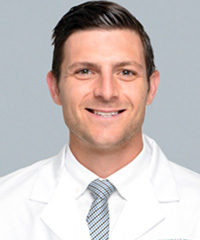Our UVM Health Network - CVMC board certified orthopedic surgeons treat a broad range of athletic, degenerative and traumatic shoulder disorders using both surgical and non-surgical techniques.
Make an Appointment
Call us to learn more about our orthopedic services or to make an appointment.
Shoulder pain is very common, which is not surprising since you use your shoulders for so many common tasks throughout the day. There are a number of causes for shoulder pain, including arthritis, trauma, injury, sprains and strains, sports injuries, and fractures.
Osteoarthritis is the leading cause of pain in the shoulder joint. As arthritis develops, the protective cartilage on the ends of the bones in a joint can wear away. Without the protective cartilage lining, the bones of the joints rub against each other, which is a major source of pain. Severe shoulder arthritis can also inhibit movement.
Our fellowship-trained surgeons treat a broad range of athletic, degenerative and traumatic shoulder disorders, and they employ the latest in non-surgical and surgical techniques to diagnose and treat these problems, including shoulder arthroscopy and rotator cuff repair. We will partner with you to develop the treatment plan that works best for your condition.
Non-Surgical Treatment for Shoulder Pain
Depending on the extent of the shoulder injury, non-surgical treatments can reduce shoulder pain and disability and restore function.
Rest and Limited Activity
Resting the shoulder and limiting overhead movement are often recommended.
Physical Therapy and Activity
Our highly skilled physical therapists work closely with you to help increase your joint's range of motion and strengthen muscles. Physical therapy and activity can reduce your knee pain and improve its functioning. Learn more about CVMC’s Physical Therapy team.
Assistive Devices
Using supportive devices such as a sling can be beneficial.
Other Treatments
Additional methods may be recommended to relieve knee pain and improve functioning. These can include:
- Applying heat or ice
- Doing water exercises
- Using liniments
- Using elastic bandages
Medication
Medication can be a very effective option for treating shoulder pain. We offer the full range of medical therapies and the latest medicines available to treat your condition.
- Anti-inflammatory and Pain Medicine
Many patients use over-the-counter medications to help control pain and inflammation in the joints, including: Aspirin, Ibuprofen, and Naproxen to reduce inflammation and Acetaminophen to control pain. - Cortisone Injections
This treatment involves injecting powerful anti-inflammatory medicines into your joint to temporarily relieve pain and swelling. Additionally, injections are helpful in accurately locating the source of the problem.
Click here to learn more about injections available at UVM Health Network – CVMC.
Surgery for Shoulder Pain
When non-surgical treatments are not successful, an orthopedic surgeon may recommend surgery to treat your shoulder pain.
Arthroscopy
Arthroscopy is a minimally invasive, outpatient surgery that enables an orthopedic surgeon to see inside your shoulder joint, allowing the surgeon to diagnose and treat your rotator cuff injury.
The procedure works by inserting a tiny camera through a small incision. The camera provides a clear view of the inside of the shoulder joint, which is transmitted via fiber optic technology to a television monitor. Your orthopedic surgeon then inserts surgical instruments through other small incisions to perform the repair.
Mini-Open Repair
Our orthopedic surgeons also perform a procedure known as mini-open repair to treat rotator cuff injury.
Mini-open repair is a type of open surgery, performed on a smaller scale, using fewer incisions. Additionally, an orthopedic surgeon also uses arthroscopy to visualize the tear and to assess and treat any damage to other structures within the joint.
Shoulder Replacement
Total Shoulder Replacement
Shoulder replacement - although less common than hip or knee replacement - is just as successful in relieving joint pain due to joint wear. Shoulder replacement may be recommended if you have severe arthritis. Patients have the confidence of working with a dedicated team of highly trained and experienced providers.
Shoulder replacement surgery involves replacing the arthritic joint surfaces with a highly polished metal ball attached to a stem, and a plastic socket.
Reverse Shoulder Replacement
With reverse shoulder replacement, the two main pieces of the shoulder (ball and socket) are reversed. This procedure is especially helpful in situations where the rotator cuff cannot be repaired and the joint is worn.
In a healthy shoulder, the upper arm bone ends in a ball shape. It fits into a socket formed by the shoulder blade. When reversed, the socket is placed on the upper arm bone. The ball portion is attached to the shoulder blade.
This procedure is used for patients whose rotator cuff muscles have degenerated or weakened. They can no longer hold the shoulder joint intact. Arthritis is usually a factor.
The surgery is also used in cases of:
- Revisions to previous surgery
- Failed shoulder replacement
- Shoulder fractures
- Lack of a rotator cuff
If you are experiencing shoulder pain, call us today at 802-225-3970 to learn more about our comprehensive shoulder treatments.
 Orthopedic Surgeon
Orthopedic Surgeon Orthopedic Surgeon
Orthopedic Surgeon Orthopedic Surgeon
Orthopedic Surgeon

